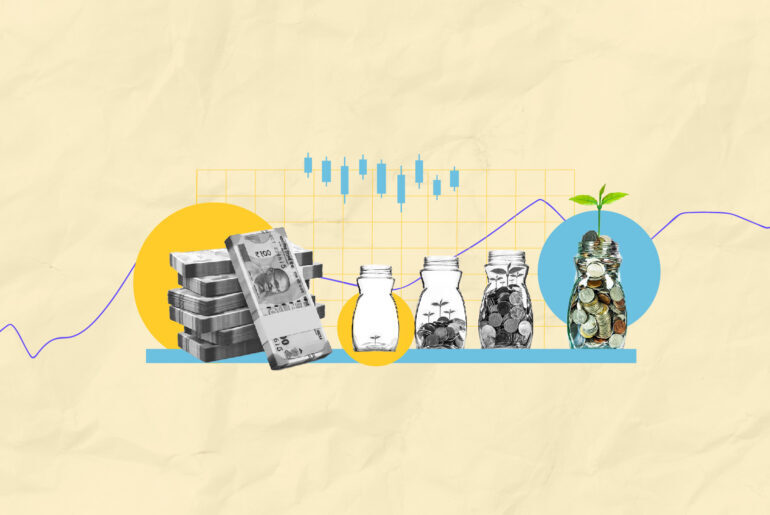Last Updated on May 24, 2022 by
Dividends are the additional payouts that shareholders receive when the company that they are holding shares in earns profits and decides to distribute them. Companies do so through two methods – cash dividends or stock dividends.
When faced with a choice of investing in companies that pay dividends, it is best to study their history and payout strategy to help you pick the right company that is aligned with your investment strategy. Read on further to understand dividend types more in detail.
Table of Contents
What are cash dividends?
Cash dividends are a type of dividend paid out by companies (to their shareholders) on a per-share basis. As is evident by the name, these are paid out directly in cash to the investors. Cash dividends are given out on a periodic basis, like monthly, quarterly, etc.
Many people use these dividends to supplement their regular income. However, not all companies pay regular cash dividends; some companies may pay them in case of a special non-recurring event, like a large contract settlement, and so on. When looking for cash dividends, it is advisable to look for companies that have a history of paying cash dividends and are currently healthy in terms of cash flows, debt ratios, etc.
For instance, GAIL India announced a dividend of Rs. 4 per equity share. This means that if you owned 50 shares, you would receive a cash dividend of Rs. 200.
However, note that companies are not under any compulsion to declare dividends at all. Alternatively, they may reinvest their earnings into the company itself for expansion or other growth prospects.
What are stock dividends?
Stock dividends are another type of dividend given out to shareholders by companies. However, here, the dividends are given in the form of stocks. For instance, if a company declares a stock dividend of 12%, it would imply that a shareholder who holds 100 shares would receive 12 additional shares.
Of course, investors who wish to expand their portfolio would naturally tend to prefer stock dividends over cash dividends. This is because stock dividends help expand the shareholding of investors in the company for no cost. Additionally, in the event of a run-up in the stock price, you receive the benefit of capital appreciation, which can be greater than the cash dividend received per share.
Usually, there is a lock-in period for stocks that are received through dividends. Shareholders cannot sell their dividend stocks during the lock-in period. This ensures that the company’s shares do not flood the market immediately and bring down its value.
Cash Dividends vs stock dividends
| Point of difference | Cash dividend | Stock dividend |
Medium of payment | Cash/money | Stocks |
Benefit to shareholders | Supplements income | Helps in growing the portfolio |
Frequency of use | Commonly issued by companies | Not very commonly issued |
Associated risk | Risk-free as far as liquidity is concerned | Risk is associated with fluctuations in the share price |
Taxation | It is taxed per the income tax bracket of the investor. | Taxes are applied only when the shares are sold. |
Options to shareholders | Shareholders have no options beyond accepting the allotted cash dividends. | Shareholders can sell their shares after the stipulated lock-in period or keep them. |
Short or long-term | Cash dividends are preferred by short-term shareholders as they do not intend to stay invested in the company in the future. | Long-term investors prefer stock dividends as they intend to stay with the company in the long term and believe that the share values will increase in the future. |
Effect on cash reserves of the company | The cash reserves are depleted. | No effect on cash reserves. |
Effect on share price of the company | No impact on the share price. | Shares are devalued as the number of shares increases while the market capitalization remains the same. |
Investor profile best suited for different dividend payouts
It is usually observed that well-established and healthy companies announce cash dividends while growing companies announce stock dividends. This might affect your choice. But before you decide which is the better option for you, you should be aware of instances:
Cash dividends
You should opt to invest in companies that provide cash dividends when you:
- Require a regular income
- Need risk-free dividends
- Do not plan to stay invested in the company in the long term
- Wish to invest in other ventures
Stock dividends
Stock dividends are ideal when you:
- Wish to grow your portfolio
- Believe that the company will grow tremendously in the future
- Plan to stay invested in the company in the long term
Conclusion
While stock dividends have a clear advantage by providing expanded shareholding at no cost that may additionally benefit through capital appreciation in case of stock price rise, the market risk is also higher in it.
On the other hand, cash dividends are one-time assured payouts that happen as part of dividend declarations. Remember that there is no compulsion for companies to declare dividends. It is rather just a benefit or a reward that companies give the shareholders for having placed their trust (and money) in the company.
That said, cash dividends and stock dividends both have their own merits and demerits. If you want to use the dividend investing strategy, you may want to look at the history of dividend declaration and then choose companies that best align with your expectations and sit well with your overall financial plan.
- How To Declare Mutual Funds in ITR & Disclose Capital Gains in India? - Jun 6, 2025
- How To Sell or Exit Your Mutual Funds in India? - Jun 6, 2025
- Fund of Funds (FOF): Meaning, Types & Advantages - May 13, 2025





